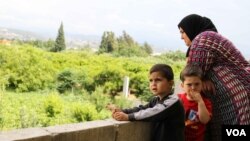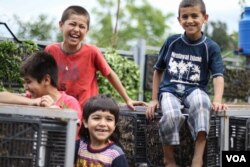Carefully tending to the various herbs that sprout above the land she cannot own, Sobhiyeh Abdel Aziz Hosni -- for a while at least -- is able to forget the many problems that she and her family face.
As Syrian refugees who have lived in Lebanon for three years, their problems are numerous -- whether it’s the daily struggle of borderline poverty or the constant fear of the authorities.
Now, due to a new take on the kind of gardens more often associated with chic districts of the capital city of Beirut, this mother of four has a place not just to escape, but to cultivate a better future.
Defying belief
Outside the half-built concrete shell that constitutes home in the northern Lebanese district of Akkar stand walls of “vertical gardens,” where for the past few months, herbs like coriander and parsley, as well as plants like spinach, have grown.
They are the result of a project that was launched earlier this year to offer both Syrian refugees and vulnerable Lebanese families the chance to become novice horticulturalists.
Hosni, who used to grow roses outside her home in Homs, is among neighboring Syrian families who, with a bit of tuition, cultivated the herbs.
“At first I didn’t believe it would work,” she said, “but they grew, and now [the garden] brings me and all my neighbors closer together.”
The small enclave of green is one of eight such sites across northern Lebanon, with the project focusing particularly on giving women a space of their own, said Rita Abdelmasih.
“Many are not necessarily given the right to go out; this allows them a space in which to express themselves,” said Abdelmasih, an agricultural engineer who has worked on the project. “It’s therapy too. With everything bad that has happened, this small green space will give you hope - you can see life in it.”
A chance at happiness
Although Hosni has a supportive husband, life remains tough.
They are among more than 1.2 million Syrian refugees in the country, most of whom are legally barred from working, let alone owning or cultivating their own land.
Currently deep in debt, her family relies on monthly handouts from the United Nations that barely cover their weekly expenses, and now their landlord is threatening to charge them more money.
Hosni finds peace in tending to the herbs.
“We take care of them every day, not just me but all the women here,” she said. “This work gives us some happiness; it’s a space to go out in so that we don’t have to spend all day at home.”
Accessible to all
It has taken more than half a decade of research to give these women their respite from reality.
Experts at the American University of Beirut have been looking at ways to lower the cost of urban gardening, such as the use of vertical gardens which require less land, to make their benefits accessible to all.
“The idea was to use it not as a luxury item but make it affordable,” said professor of landscape horticulture Salma Talhouk.
This project was backed by the U.N.'s Food and Agriculture Organization, and Talhouk said that their efforts to lower the cost of vertical gardens down to around $12 a square meter - compared to high-end competitors where the rate can be $1,000 - helped raise the prospects of getting funding in the future.
"Do it yourself" vertical gardens were also possible, she said, adding, “It’s about developing ideas and models that encourage people to think for themselves.”
No going back
With the first stage of their project coming to an end, members of Hosni's community are now looking to maintain the vertical gardens by themselves.
Vegetables, they hope, could be the next addition; but, although the garden offers temporary relief, the reality of their situation is never far away.
“If we have space when we go back to Syria, we’d want to do this,” Hosni's husband Jamal told VOA, before pausing. “But who can go back now? No one can go back.”












